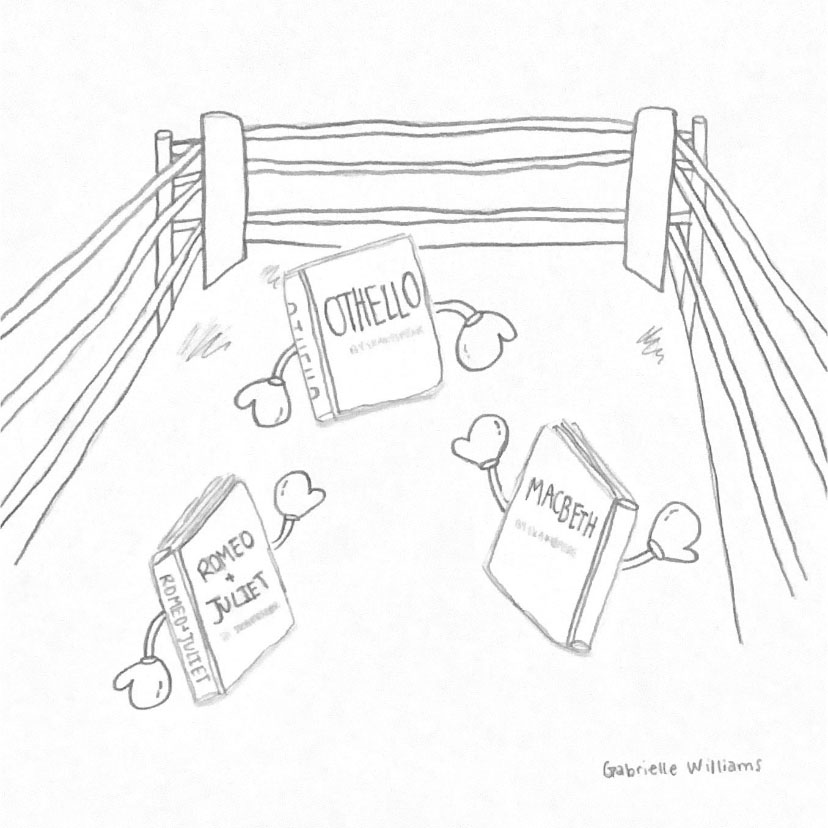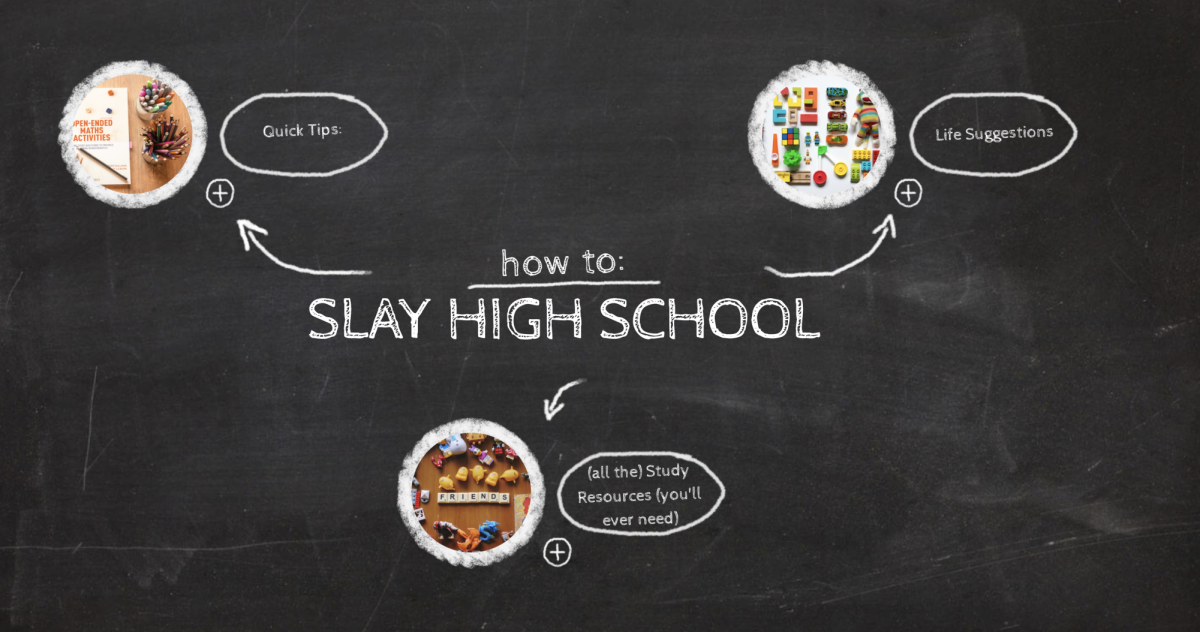At Parkway Central, most students on the AP English track read three Shakespeare plays in their high school career. “Romeo and Juliet,” “Macbeth”and “Othello.” A lot of students leave high school believing that they hate Shakespeare, and many of them go on for the rest of their lives not thinking about any of his plays. However, some go on to become English teachers and they find themselves sitting around forming strong opinions about Shakespeare’s plays. As a senior who has officially read all three of the Shakespeare plays taught in our English curriculum, I have some opinions of my own about which play I think is the best. As a way to both support and challenge my opinion, I talked to five Central English teachers about which Shakespeare play they believed to be their favorite.
“Romeo and Juliet”
All Central students read “Romeo and Juliet” their freshman year of high school, which I believe to be the worst of the three plays we read. I walked around for a while believing that I hated Shakespeare because of this play, and it’s a darn shame that we teach it to freshmen and make them believe the same as I once did. My main criticism of the play (in relevance to “Macbeth” and “Othello”) is that it’s a little shallow. I think the characters in “Romeo and Juliet” aren’t as deep or nuanced as the characters in “Macbeth” or “Othello.”
One of the first English teachers I spoke to was Christian Schaeffer, and he had some thoughts regarding why we continue to teach “Romeo and Juliet” in school.
“I think it’s fun. I think from a cultural literacy perspective, it’s pretty important that kids read it, because everyone thinks they know that it’s just young love, and it’s so great, and it’s so powerful. It’s like, no, they’re idiots,” Schaeffer said. I think he’s absolutely right, it’s a cultural staple in literature. However, if I’m being completely honest I don’t really understand why it’s such a staple. So I went to talk to English teacher Joel Ruprecht, who took the stance of arguing in favor of “Romeo and Juliet.”
“The main characters are high-school-aged and are acting very ‘extra’ throughout the entire play, which speaks to everyone, but high schoolers especially, in terms of how people can act solely out of emotion, resulting in some rough–albeit entertaining–outcomes,” Ruprecht said. While it’s true that the themes of “Romeo and Juliet” do speak to everyone in regards to how people can act off of emotion, I think that Romeo and Juliet aren’t any more relatable than Macbeth or Othello because of their ages. High schoolers in the present day can’t just run off and marry someone they met at a party three days earlier, because that would be very challenging legally. Romeo and Juliet’s ages are seemingly unimportant with regard to how high school students view the play. Most of the themes we discuss in class are about family feuds and rash acts, both of which don’t have an age requirement. When I discussed “Romeo and Juliet” with English teacher Libby Reed, she made a very good point about the play’s inability to be applied to modern day life, in a world where we are never really cut off from one another.
“It also doesn’t translate as well now because you’re not going to miss that Juliet got sent back because you’re just going to text each other,” Reed said. Overall, I agree that there are themes present throughout “Romeo and Juliet” that make the play a good choice for high school students to read. However, I think that “Macbeth”and “Othello” address similar themes in a better way than “Romeo and Juliet” do.
“Macbeth”
Among the English department (and myself) this play was a lot more popular than “Romeo and Juliet.” Schaeffer claimed that “Macbeth” was his favorite of the three.
“Every sophomore can kind of roll with ‘Macbeth,’” Schaeffer said. Most of the English department agreed that students tend to do well with this play over “Romeo and Juliet.” Along with Schaeffer, Marissa Farrell also argued in favor of “Macbeth.”
“I love the student interest in ‘Macbeth,’” Farrell said. “I think students respond best because it’s not the sappy love story that they are used to from freshman year.” “Macbeth” definitely gets a better reaction out of students due to some of its iconic moments such as the banquet scene. Jason Lovera argued in favor of “Othello,” however he claimed that “Macbeth” was a very close second.
“If I had to pick my favorite scene out of any Shakespeare play, it would be the banquet scene,” Lovera said. There are a multitude of scenes in “Macbeth” that are amazing. The dagger scene is absolutely iconic and one that I have shamelessly referenced in real life. “Macbeth” also hads some incredible characters such as Lady Macbeth, an iconic female villain. I think there is so much excitement all throughout the work that makes it more digestible and entertaining for high schoolers compared to “Romeo and Juliet,” which I feel is a little bit boring.
“It’s fun, people get beheaded, there are witches. What’s not to love about that? There’s buckets of blood that get spilled in ‘Macbeth,’ that is fun to talk about,” Schaeffer said. At Central we teach freshman “Romeo and Juliet” because young teenagers can relate most to impulsive and reckless decision making. But I think students relate more to “Macbeth” because it’s such an interesting story about pride and paranoia. What’s more impulsive and reckless than a killing spree? I think it’s safe to say that a majority of students who have read all three plays would favor “Macbeth” because it does have a very entertaining appeal. However, I still don’t think it’s the best of the three.
“Othello”
My favorite of the three plays is “Othello,” which happens to be the most recent of the three that I have read. I believe that all of the things that make “Romeo and Juliet” and “Macbeth” good plays are present in “Othello.” The play deals with pride, revenge, manipulation, impulses, jealousy and social conflicts in more complex ways than both other plays.
“I think individual scenes in ‘Macbeth’ are more exciting than individual scenes in ‘Othello,’ but I think the characters in ‘Othello’ are more interesting,” Lovera said. To me the play as a whole is more important than individual scenes. “Othello” was exciting to read because of the progression of Iago’s manipulation and the way he made Othello go insane. While “Macbeth” does have great scenes, I don’t sit around and think about the play the way I do with “Othello.” Iago’s character makes the play great.
“What I think is interesting about ‘Othello’ is readers are interested in evil — I know we have evil in ‘Macbeth’ but when it’s encapsulated in one character and how he operates and how he can affect people as an external force — I think that’s what makes Iago so interesting to people,” Lovera said. Iago’s development as a personification of evil throughout the play makes every part of the story so interesting. I think that because of the effect that evil has on the characters, there’s more to think about and discuss with “Othello” compared to the other two plays.
“[‘Macbeth’] is not as compelling to me, intellectually there’s more to talk about with ‘Othello,’ and because there’s more to talk about it’s also more fun to teach,” Reed said. Overall, I think “Othello” is such a great piece of literature. I believed that I didn’t like Shakespeare until I read “Othello,” so I definitely encourage students to stay on track for AP Lit so they can have the opportunity to read “Othello” too. Literature is so subjective, however I think some pieces of work are just so great that it’s hard for anything to out-compete them. “Othello” brought Iago into the literary world, and that’s a pretty hard villain to beat.
“[Iago’s] villainy is just so subtle, he’s so dark and evil and he knows it. His character is so unabashedly evil you just have to sit there and be like, ‘woah,’” Reed said.



